
U.S. District Court for the Southern District of New York
NEW YORK - Lawyers hoping for work trips to Hawaii were denied recently by the panel that coordinates similar lawsuits.
Plaintiffs in six cases suing L'Oreal over acne medication that allegedly turns into benzene lost their bid to transfer their cases to Hawaii federal court, with the U.S. Judicial Panel on Multidistrict Litigation, instead opting to let the lawsuits play out a little further.
L'Oreal had opposed consolidation but in the alternative, wanted the cases in New York. There are three cases there, and the other three had transfer motions and challenges to venue pending. The sides on May 28 agreed to put all six in New York federal court.
The firms Aylstock, Witkin, Kreis & Overholtz and Bursor and Fisher are named interim lead counsel for the plaintiffs.
"Moving Plaintiffs represent that both firms have invested substantial time and resources in pre-filing investigation and development of legal theories, and the firms filed three of the earliest actions in this consolidated matter," wrote Judge Analisa Torres, who will preside over the cases.
The MDL panel refused last year to consolidate 28 class actions that followed a study by the drug-testing lab Valisure, which says the benzoyl peroxide in acne meds turns into benzene, a known carcinogen, under extreme heat.
Valisure created tens of thousands of lawsuits with its findings on an ingredient in heartburn medication Zantac when it heated it to 266 degrees Fahrenheit in an artificial stomach to create NDMA. It also exposed Zantac to salt levels that would kill a human.
For the acne medicines, it heated them to 170 degrees for extended periods of time, saying it was a reasonable estimation of what might occur in a shipping container or hot car.
When it presented its findings to the FDA in a citizen petition, lawsuits followed. They don't allege injuries from benzene exposure - only that customers would not have bought them had they known of the potential for the chemical to be in them.
One woman - Lucinda O'Dea - filed five lawsuits in one day. But they are against five separate companies regarding five different products.
Based on past history, the law firms suing over Valisure’s claims can expect to make lots of money in fees. Milberg Cohen and Bursor & Fisher shared $833,000 in fees on a $3.1 million settlement of Valisure-fueled claims over dry shampoo and $1 million in fees from a $3 million settlement with Walmart over hand sanitizer that Valisure said contained benzene.
Around 30 lawsuits followed Valisure's testing on acne medication. But they are in jeopardy now, after the FDA tested 95 acne drugs and found only six lots with with small problems, all nearing their expiration dates.
"Even with daily use of these products for decades, the risk of a person developing cancer because of exposure to benzene found in these products is very low," the FDA wrote.
The FDA went on to warn labs like Valisure to use validated testing methods, saying Valisure's processes may result in much higher reported levels of contaminants like benzene.
"FDA has continued to raise concern that use of unvalidated testing methods by third-party laboratories can produce inaccurate results leading to consumer confusion," the FDA said.
Valisure heated acne medicines to 170 degrees Fahrenheit and found "concerningly high levels of benzene in only 18 days." Valisure said the temperature was a reasonable estimation of what might occur in a shipping container or a hot car.
It was a similar process that produced NDMA in the heartburn medicine Zantac. And though the FDA similarly rejected those findings, lawsuits pressed on.
A federal judge in Florida dismissed about 50,000 lawsuits after finding Valisure's methods didn't fit expert witness standards, but judges in Delaware and California reached the opposite conclusion and allowed lawsuits there to proceed.
That green light caused a massive spike in advertising for lawyers trying to find Zantac clients. The research firm X Ante found trial lawyers went from $3,000 on Zantac ads in May, then after the Delaware ruling that figure went up to $1.8 million in June and July.
Valisure's big payday is coming from a lawsuit in which it purported to represent the interests of the federal government over payments for Zantac. It will get a significant chunk of a $67.5 million settlement with GlaxoSmithKline.


